ARTICLE AD BOX

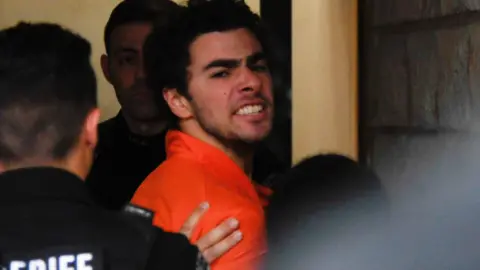 Reuters
Reuters
Luigi Mangione, 26, a suspect in the New York City killing of UnitedHealth executive Brian Thompson, arrives for an extradition hearing at in Hollidaysburg, Pennsylvania, on Tuesday.
It wasn't DNA or facial recognition technology that cracked the case. Nor did amateur online investigators hunting for clues break open the case.
In the end, it was a McDonald's restaurant employee - hours away from the scene of the crime - who spotted a man resembling a "person of interest" photo.
The suspect was careful to wear a mask while traveling around New York City, but pulled it down for a second to flirt with a woman behind the desk at a youth hostel, and again to eat at McDonald's.
That may have been enough.
Police in Altoona, Pennsylvania swooped into the restaurant and arrested Luigi Mangione, a 26-year-old from a wealthy Baltimore-area family with an expensive private and Ivy League education.
After six dramatic days, the hunt for the man alleged to have gunned down UnitedHealth CEO Brian Thompson was over.
A call from McDonald's
Watch: Luigi Mangione arrives at Pennsylvania courthouse
On Monday morning, a regular at the McDonald's in Altoona told the BBC that one of his friends spotted Mr Mangione as he entered the restaurant and commented: "There's that shooter from New York".
"I thought he was kidding," the customer said.
Police were called and when officers first approached Mr Mangione and asked him if he'd been in New York, he became "visibly nervous, kind of shaking", Altoona's Deputy Chief Derick Swope told reporters.
As he was being led into a court hearing Tuesday, Mr Mangione shouted about an "insult to the American people and their lived experience".
He now faces charges of second-degree murder along with weapons offenses.
Watch: Luigi Mangione shouts at reporters while escorted into court
New York police say the suspect first arrived in the city on 24 November, in the busy run-up to the Thanksgiving holiday. He visited the Hilton Hotel, where the shooting would later happen, and his encounter with a clerk at the hostel, where he stayed, was captured on camera.
Ten days later, on 4 December, Mr Thompson was shot dead on his way to a meeting at about quarter to seven in the morning.
The suspect fled by foot, bike and taxi to a bus station near the George Washington Bridge. From there, he exited the city.
The killing was identified as a targeted attack early on in the investigation. Video showed the suspect ignored several pedestrians on the busy Manhattan pavement and zeroed in on Mr Thompson.
Shell casings at the scene had words written on them, thought to be references to the insurance industry: "delay", "deny", "depose".
"Everything going for him" - then he vanished
Mr Mangione comes from a large and wealthy family in Baltimore, Maryland, with business interests in nursing homes, real estate, a country club and a radio station, according to local news outlet the Baltimore Banner.
He attended the all-male private Gilman School, where he graduated as valedictorian – at the top of his class.
A former classmate, Freddie Leatherbury, told the Associated Press news agency that Mr Mangione came from a wealthy family, even by that private school's standards. "Quite honestly, he had everything going for him," Mr Leatherbury said.
Mr Mangione went on to the University of Pennsylvania. There he received bachelor's and master's degrees in computer science, according to the school, and founded a video game development club.
A friend who attended the Ivy League school at the same time as Mr Mangione described him as a "super normal" and "smart person".
He worked as a data engineer and a video game developer, and most recently was living in Hawaii.
Social media posts show that friends and family members had recently been attempting to contact him and asking about his whereabouts.
In a post on X from October, someone asked Mr Mangione: "Hey, are you ok? Nobody has heard from you in months, and apparently your family is looking for you."

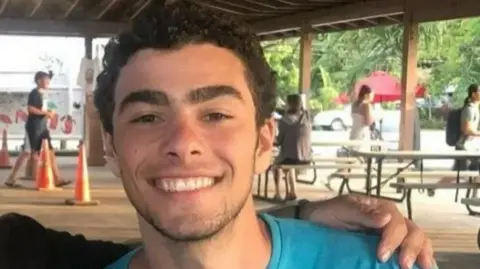 Instagram
Instagram
A picture from Luigi Mangione's Instagram account
Education, expertise and evading police for days

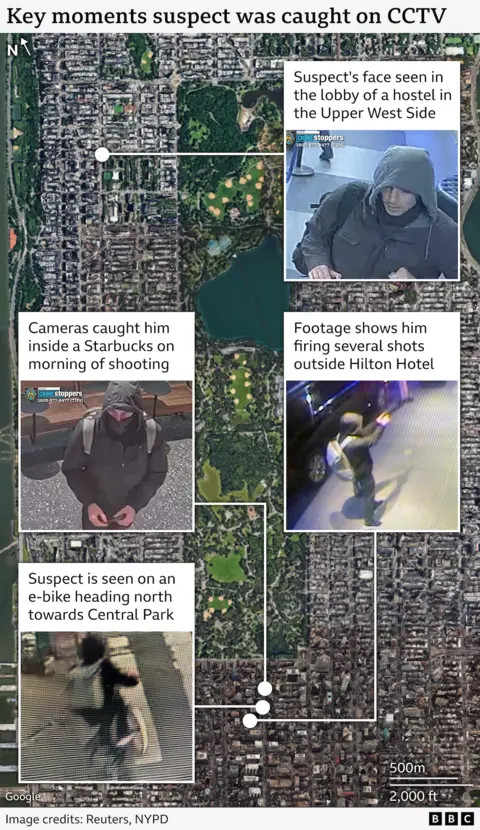
Monday's arrest ended a dramatic six days in which the alleged killer seemed to disappear, leaving few clues behind and eluding police.
Not only was he able to leave one of the busiest cities in the world using public transport, before Monday his name was not publicly known. It's also unclear exactly where he was hiding in the days after he left New York.
Juliette Kayyem, former assistant secretary for policy at the US Department of Homeland Security, told BBC Radio 4's Today programme that his background in technology may have helped him evade capture for nearly a week.
"This was someone who was studying how law enforcement and how these cities try to protect themselves, which is essentially they have lots of cameras around," she said.
"Now that we know a little bit about him - that he's a smart person, he went to great schools, he had higher degrees, he studied engineering technology, he was into electronic gizmos - some of it is beginning to make sense," Kayyem said.
The suspect also wore a face mask almost constantly, and Mr Mangione was found with a fake driving licence and an untraceable "ghost gun" – a firearm assembled by the owner without a serial number, which police said may have been 3D-printed.

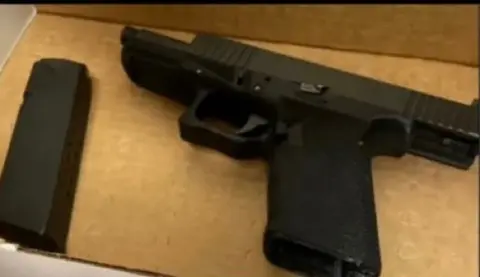 CBS News
CBS News
Authorities said he used cash for purchases in New York City and fled the scene of the crime into Central Park, where there are few surveillance cameras.
But he also appeared to make some elementary mistakes – including revealing his face in the hostel, and holding on to the gun and the fake identification card.
The Mr Mangione family released a statement Monday night through Mangione's cousin, a Maryland state lawmaker.
"Our family is shocked and devastated by Luigi's arrest," said Nino Mangione. "We offer prayers to the family of Brian Thompson and we ask people to pray for all involved."
Clues from a manifesto and book reviews
Mr Mangione's online footprint shows few messages about health care or the insurance industry. Instead there are comments about artificial intelligence and technology, science and pop philosophy, and reviews of a range of books, including 1984 and the Harry Potter series.
But a number of social media accounts matching his name and picture offer some potential clues about his motivation.
RJ Martin, a former roommate of Mr Mangione's at a co-living and co-working community in Hawaii, told CNN that the suspect had a back injury.
"He sent me the X-rays," Martin said. "It looked heinous, with just giant screws going into his spine."
The banner image on his X account shows an X-ray of a spine with hardware in it.

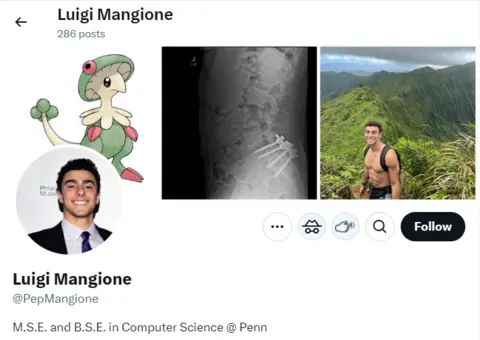 X
X
The banner of Mr Mangione's X account showing an x-ray and other photos
And his account on Goodreads, a user-generated book review website, indicated that he had read several books about managing back pain, one of them called Crooked: Outwitting the Back Pain Industry.
Also on the Goodreads site, Mr Mangione gave four stars to a text called Industrial Society and Its Future by Theodore Kaczynski – better known as the Unabomber manifesto.
Starting in 1978, Kaczynski carried out a bombing campaign that killed three people and injured dozens of others.
In his review, Mr Mangione acknowledged Kaczynski was a violent individual who killed innocent people. However, he also argued that the essay should not be dismissed as the manifesto of a lunatic but rather the work of an "extreme political revolutionary."
He quoted another online commentator who said: "When all other forms of communication fail, violence is necessary to survive".
Mr Mangione wrote that he found the take "interesting".
Police said a three-page, handwritten document Mr Mangione had when he was arrested further suggests a motive. The pages expressed "ill will" towards corporate America.
A senior law enforcement official told the New York Times that the document said: "These parasites had it coming" and "I do apologise for any strife and trauma, but it had to be done".
Sympathy blooms for victim - and suspect

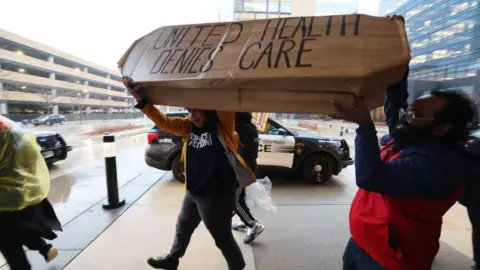 Getty Images
Getty Images
UnitedHealth has been the subject of protests from people who have been turned down for claims
Meanwhile mixed reactions to the shooting and Mr Mangione's arrest continue – sympathy for Mr Thompson and his family versus anger at the state of America's expensive, vastly complicated health care system.
In some online spaces, the shooting prompted criticism of the health insurance industry, and Mr Mangione was even hailed as a hero.
Police in Altoona said the department received hundreds of emails and calls, including death threats. Some members of the public called police in support of Mr Mangione, claiming they were actually the killer and that police "have the wrong guy".
And police are advising McDonald's employees not to give interviews or statements out of concern for their safety.
The restaurant received hundreds of negative reviews online, calling employees "rats" and criticising them for calling the police.
Similar sentiments have been expressed online, often in posts by anonymous accounts. But others have condemned such sentiments.
"In America, we do not kill people in cold blood to resolve policy differences or express a viewpoint," Pennsylvania's governor Josh Shapiro told reporters.
"I understand people have real frustration with our healthcare system… But I have no tolerance, nor should anyone, for one man using an illegal ghost gun to murder someone because he thinks his opinion matters most.
"In some dark corners, this killer is being hailed as a hero. Hear me on this: He is no hero," Shapiro said.
With reporting by Cai Pigliucci, Jessica Parker and Madeline Halpert

 5 months ago
31
5 months ago
31








 English (US) ·
English (US) ·